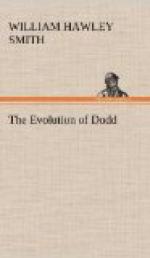So he gave him the best chamber, and bathed his head, and watched with him till far into the night. The next morning they talked it all over. “Dodd” was penitent, even to the extent of tears and bitter weeping. He pledged Mr. Bright that this should be the last time; that he would reform now. He confessed that for years he had been a miserable sinner in the matter of drink, but declared that now he would break off. In a word, he did the usual thing on such occasions.
Mr. Bright heard his pledges with a swelling heart and a thankful soul. He fondly hoped that he might save the young man yet. You may have had like hopes under similar circumstances, my gentle reader.
The scene ended with “Dodd’s” leaving Mr. Bright’s house in the afternoon of the following day, accompanied by any amount of good advice and even prayers for his future good behavior. He took with him also a ten dollar note which he had borrowed from his benefactor, just to get a start with.
CHAPTER XXI.
The wise Mr. George has remarked that “by no possibility can one really use up his living in advance.” “That is,” he explains, “it is as impossible to anticipate the products of one’s labor, and live them up before they are earned as it is to eat to-day the egg that is to be laid to-morrow.”
I do not dispute the egg part of this proposition, but I must protest that if it is impossible for a man to anticipate the products of his own labor, and to live them up in advance, it is quite possible for him to anticipate the products of what some one else has already earned, and to live them up most effectually. The only impossibility in the premise is for this some one else ever to get his own again.
This statement should pass for an axiom, since it needs no proof. You have had dollars of your own that have been appropriated thus, have you not?
And of all habits that tend to demoralize a man, this one of dead-beat borrowing is the worst. It will sap the last germ of manhood out of a soul sooner than anything else I know of. It is one of the meanest vices in society, and one of the most prevalent among a certain class of young men.
I will not say that every person who asks to borrow money from a friend without offering security is a dead-beat. Such a statement might be somewhat wide of the mark. I only assert that I have always found it so!
It was not without misgivings that Mr. Bright advanced “Dodd” the ten dollars spoken of in the last chapter. But alas, poor man, he was yet blind to the fact that whoever thus assists a person in the condition in which “Dodd” now was does that person more harm than good.
There is any amount of light nonsense current on this point. See how the method worked in this case.
“Dodd” really meant to do better when he left Mr. Bright’s. People in this condition always do mean to do better. He had made pledges to his friend and he hoped to keep them. It takes more than hoping to succeed in such eases, however.




